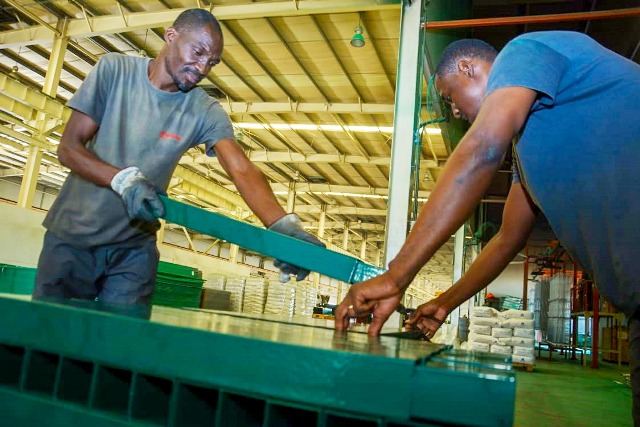Now Is The Time To Invest In Angola
Angola’s economy is on the rise and the country is showing marked signs of improvement in the economy.
President João Lourenço started his second term in office in August 2022 and he has vowed to continue to build on his previous efforts of improving the country’s economy. His work in this area started in 2017 when he introduced a series of economic and social reforms aimed at containing the impact of the decline in oil production in order to mitigate the country’s dependence on oil while prioritizing a greater volume of investments for areas such as agriculture, agro-livestock, mining, energy production and water supply.
His efforts showed positive results, as according to Angola’s National Institute of Statistics, the country’s economy expanded by 2.6% year-on-year in the first quarter of 2022, following an upwardly revised 2.4% rise in the previous three-month period. This was the fourth consecutive quarter of expansion and at the fastest pace since the last quarter of 2018.

President Lourenço’s economic reforms became even more effective with the New Private Investment Law of 2018, which put all investors, domestic and foreign, on the same footing, with the same rights to access tax incentives. Even, the sensitive issue of capital repatriation was safeguarded in its own legislation and guarantees foreign investors the right to transfer dividends or other direct investment income out of the country.
Under his presidency, the country made significant progress in reducing the national debt. In July 2022, Fitch Ratings, a leading provider of credit ratings, commentary and research for global capital markets, revised Angola’s outlook to positive from stable. They further forecast Angola’s central government debt will drop to 56.5% of the gross domestic product in 2022 from 79.7% in 2021 and 123.8% in 2020. This will help the government invest more of its revenue into improving the lives of ordinary Angolans as opposed to repaying debt.
Currently, Angola offers great opportunities for investors and entrepreneurs to develop wealth-generating projects that will contribute decisively to a sustainable and environmentally friendly economy, not only for Angolans but also for millions of citizens of sub-Saharan Africa.
One of the fundamental poles of economic diversification is the Luanda/Bengo Special Economic Zone, which quickly became a reference in Sub-Saharan Africa, providing investors and entrepreneurs with a variety of quality services, an excellent, stable business environment, with all the necessities, and unbureaucratic business practices, including a commitment to simplifying the approval of new public and private investment projects.
The ZEE is one of the main job-generating areas in Angola, with more than one hundred companies and service providers. It is run by the capable, Antonio Henriques da Silva, the Chairman of the Board of Directors of the Luanda-Bengo Special Economic Zone, who’s also the President of AIPEX, the Agency for the Promotion of Investments and
Exports of Angola.
Da Silva is the driving force behind the ZEE’s management principles
ensuring the highest international standards–as evidenced in the wide range of differentiating services ranging from the provision of public transportation for all employees, waste collection, reliable supply of fuel, water, and electricity, to the secure connection to a fibre optic network of the latest technological generation and dividends or other direct investment income out of the country.
He also pioneered the launch of the Guiché de Apoio ao Investidor (GAI) or Investor Support Office in November 2021. He says, “The GAI eliminates bureaucratic obstacles by reducing the time needed for accessing and resolving issues concerning the Angolan public administration. The GAI has contributed to an increase in the number of companies based in the ZEE, expanding the domestic production and export of goods generated by the Angolan economy and resulting, in large part, from the growth of the foreign direct investment.“
Da Silva’s next challenge is transforming the Luanda/Bengo Special Economic Zone into a Free Trade Zone. He explained, “We want this transition to boost the country’s economy and increase job opportunities. We want to establish this Free Trade Zone as a great business centre in the African region, capable of establishing connections as disparate and important as the European Union, the Middle East, Asia, and South America. In addition, this Free Trade Zone will obviously have privileged relations in the future common market of the African continent, which encompasses more than a billion potential consumers.”
The transition of the Luanda/Bengo Special Economic Zone into a Free Trade Zone involves the use of high-quality infrastructure, a specific and subsidized tax regime, laying the foundations for the development of a platform for the modernization of the productive apparatus, encouraging the use of state-of-the-art technologies that favour the growth of the Angolan economy.
With a perimeter of over 4700 hectares, the Luanda/Bengo SEZ is the largest space in Angola for the implementation of industrial projects, also integrating a commercial hub, housing projects, green areas and roads. And with the reformulation of its statute and consequent allocation of territories of the municipalities of Viana and Icolo and Bengo, the Luanda/Bengo SEZ now holds the UALA Reserve, an area with enormous potential for the development of agro-industry projects, one of the major bets of the Angolan government for the next five years.
